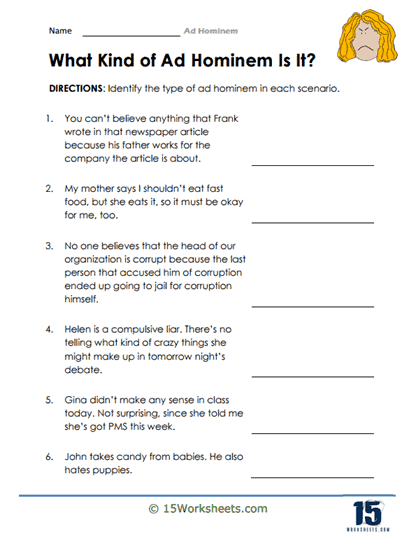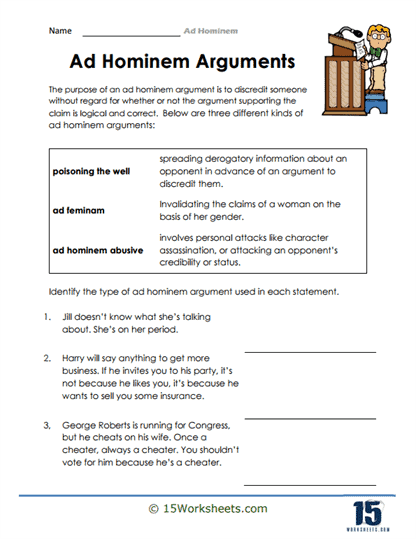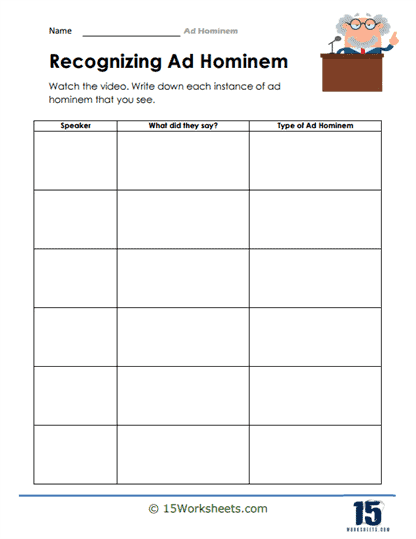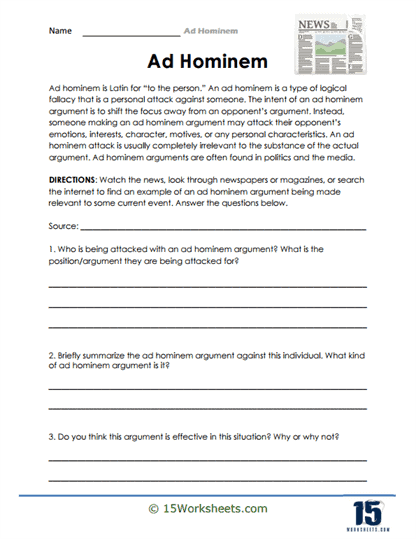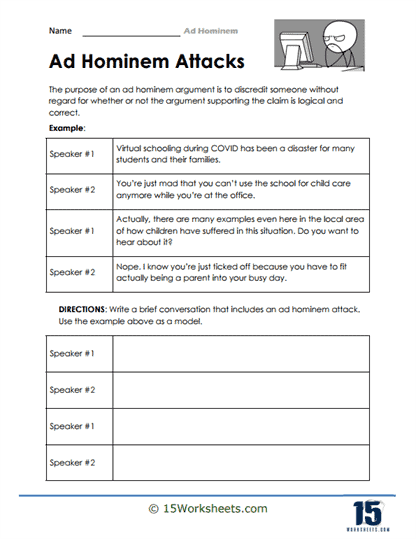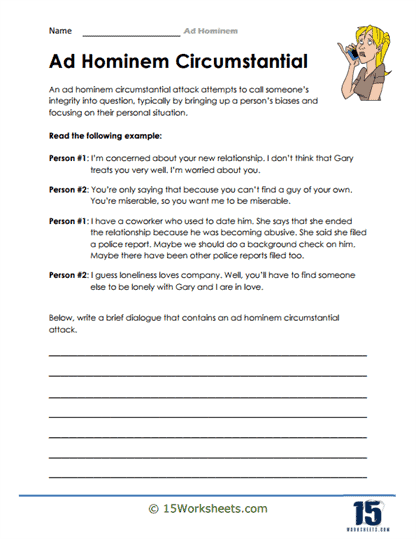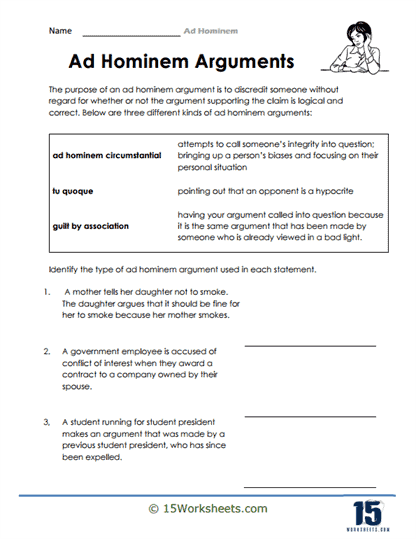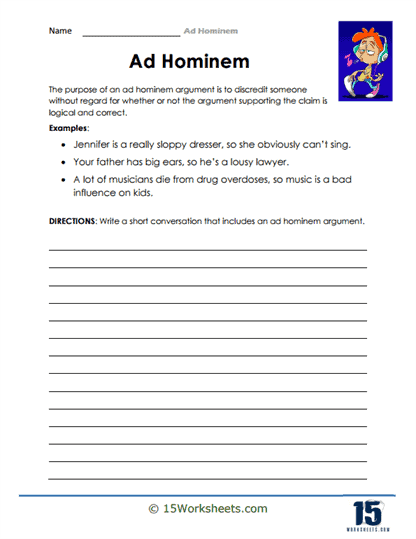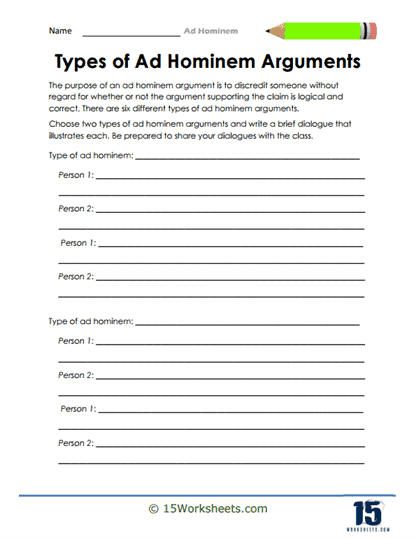Ad Hominem Worksheets
All About These 15 Worksheets
Ad Hominem, a Latin phrase that translates to “to the person,” is a fallacious argumentative tactic that involves attacking the character or personal qualities of an individual rather than addressing the substance of their argument. Understanding ad hominem is not only essential for critical thinking but also for fostering civil and rational discourse. In today’s information-driven world, where opinions and arguments abound, it is crucial for students to develop the skills to recognize and counter ad hominem attacks.
To empower students with the ability to engage in meaningful and logical discussions, we proudly present a collection of Ad Hominem worksheets. These worksheets are thoughtfully designed to provide students with structured and engaging opportunities to grasp the concept of ad hominem and its implications.
What Do These Ad Hominem Worksheets Contain?
The worksheets include examples of arguments where ad hominem fallacies are present. They provide learners with opportunities to identify and analyze these fallacies. They include questions or exercises that require students to identify the specific ad hominem fallacy used, explain why it is fallacious, and propose alternative ways to address the argument in a logical and respectful manner.
These can enhance a students’ critical thinking skills, they will learn to recognize when ad hominem fallacies are being used in discussions or debates, and learn how to respond to such fallacious arguments effectively.
What is Ad Hominem?
Ad hominem occurs when someone tries to win an argument by saying mean or hurtful things about the other person instead of discussing the actual topic. Rather than focusing on the ideas or reasons the person has, they attack the person themselves. This approach is unfair and unkind because it diverts attention from the important aspects of the discussion.
Here are some examples for you in basic conversations:
Example: Amy and Jake are talking about their favorite sports teams.
Ad Hominem – Jake says, “Your team is stupid because you’re not good at playing sports.”
Example: Sarah and Tom are discussing their favorite ice cream flavors.
Ad Hominem – Sarah argues, “You have bad taste because you’re not cool like me.”
Example: Mia and Max are debating whether cats or dogs make better pets.
Ad Hominem – Max claims, “Your opinion doesn’t count because you’re just a kid, and kids don’t know anything.”
Example: Lily and Ethan are discussing their favorite TV shows.
Ad Hominem – Ethan dismisses Lily’s choice, saying, “Your show is dumb because you’re not as smart as me.”
Example: Ava and Noah are talking about their favorite hobbies.
Ad Hominem – Noah argues, “Your hobby is boring because you’re not as talented as I am.”
The Importance of Understanding Ad Hominem
Understanding ad hominem and its logical fallacy is of great importance for several reasons:
- Critical Thinking: Recognizing ad hominem attacks is a cornerstone of critical thinking. It allows individuals to assess arguments based on their merits rather than being swayed by personal attacks.
- Effective Communication: In today’s interconnected world, effective communication is vital. Being able to identify and respond to ad hominem arguments enhances one’s ability to engage in civil and productive discourse.
- Conflict Resolution: Understanding ad hominem can be a valuable tool in conflict resolution, enabling individuals to focus on the issues at hand rather than devolving into personal attacks.
- Media Literacy: In a world inundated with information and misinformation, being able to spot ad hominem attacks in media and public discourse is essential for informed decision-making.
This collection of Ad Hominem worksheets is a valuable resource for educators and parents committed to nurturing critical thinking and effective communication skills in students. Proficiency in recognizing and countering ad hominem arguments is a powerful tool that equips individuals to engage in rational, respectful, and evidence-based discussions.
This collection is an investment in their future success, ensuring they have the skills to navigate complex issues, make informed decisions, and contribute meaningfully to society. Embrace the Ad Hominem worksheets collection today, and watch your students excel in their journey toward becoming critical thinkers and thoughtful communicators.





